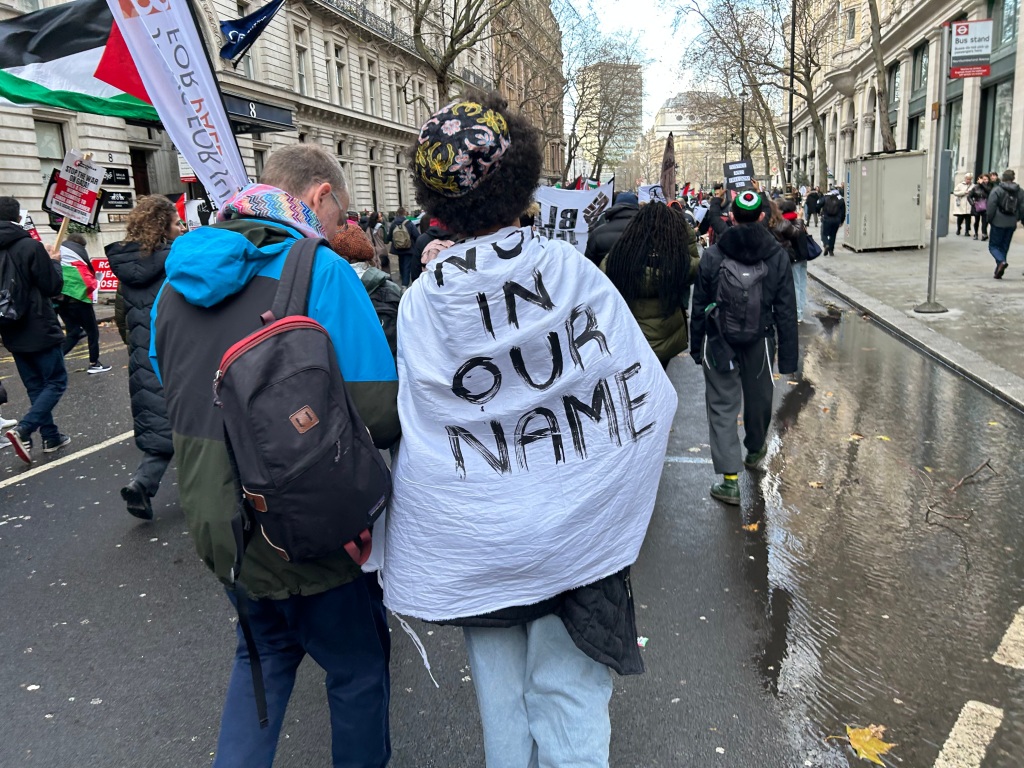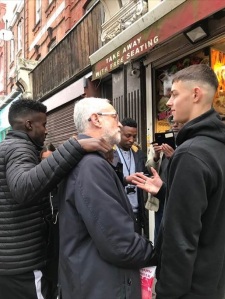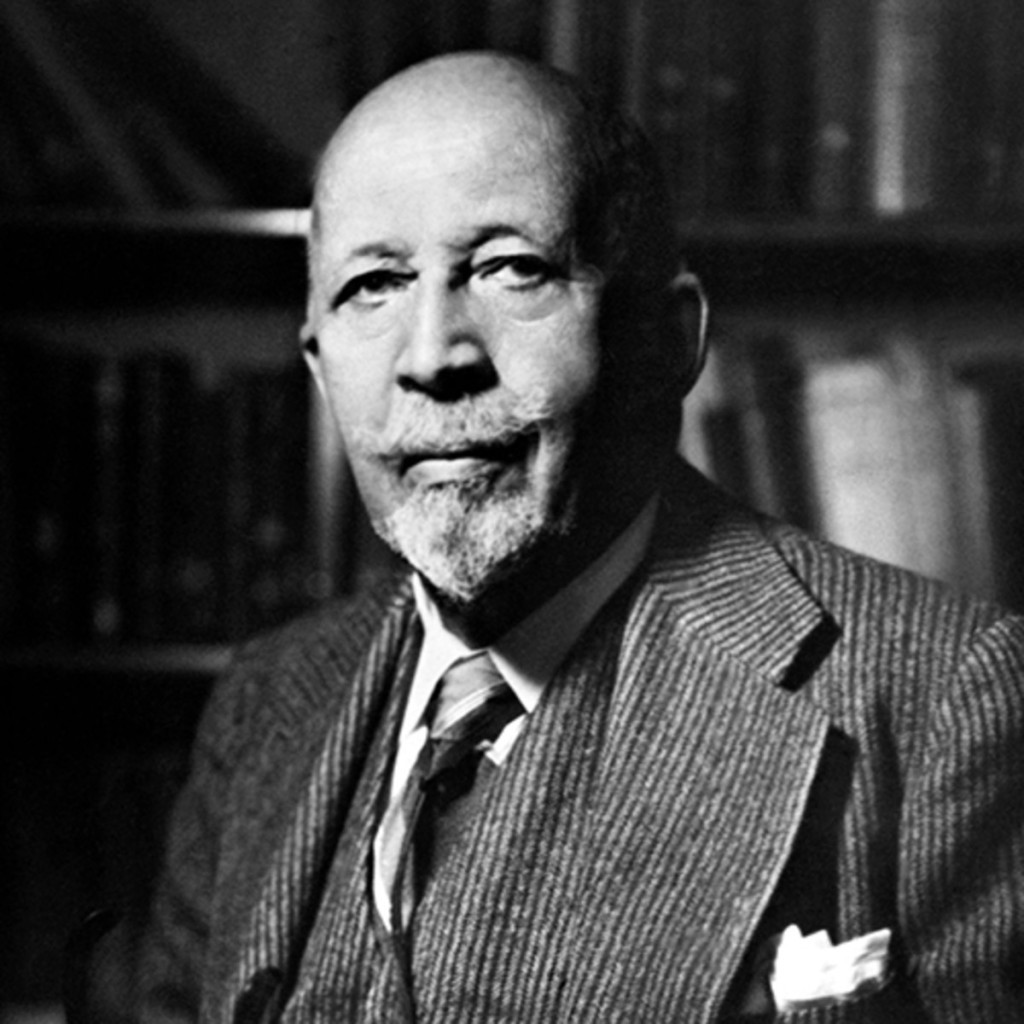The policing of Jews on Palestine protests reveals alarming ignorance laced with racist assumptions

Photo: David Rosenberg
On the most recent Palestine demonstration in London, on 9th December 2023, the Jewish Bloc found itself subject to unwanted and unwarranted “protection” from the police. The route of the march was from the heart of the City of London to Westminster, and we had planned from the outset to stop outside St Clement Danes Church at the Aldwych and stand on the pavement as the march went past. This had the twofold aim of gathering stragglers who’d become separated from the bloc, and making a static, visible statement of Jewish solidarity with the Palestinians before we rejoined the march and continued on to Parliament Square.
We’ve done this on several Palestine demonstrations now. On this occasion, the Jewish bloc had gathered at the start of the march in Old Jewry, a medieval street in the City. Our meeting point was a plaque commemorating a former synagogue that had been on the site until 1272, shortly before the expulsion of the Jews from England in 1290.
As has happened on every demonstration, the Jewish bloc was greeted with warmth and enthusiasm, and when we reached our stopping point, the marchers cheered and clapped as they passed, defying the claim that these are hate marches fuelled by antisemitism, that are making our cities unsafe for Jews. On the contrary, participants come and talk to us, shake hands, hug us. They take photos of our banners and placards, which represent many Jewish groups, including the Jewish Socialists’ Group, Jewish Voice for Labour, Na’amod, Israel Coalition Against House Demolitions, Black Jewish Alliance, Jews for Justice for Palestinians and others, as well as individuals who coalesce around the bloc.
This time, though, almost as soon as we stopped at St Clement Danes, a cordon of police officers materialised in front of us, separating us from the march. They apparently had the idea that, since we were Jews, we must be counterdemonstrators. We tried again and again to explain that we were there in support of the Palestinians, and had been present on the entire march. This shouldn’t have been hard: anyone who could read the placards and hear the chants – Free free Palestine! Ceasefire now! Not in our name! – would have understood.
But they simply couldn’t or wouldn’t compute the idea of Jews supporting Palestinians. This isn’t the first time. We’re getting used to police seeing the word “Jewish” on banners and telling us which side we’re on – and if we don’t agree, trying to stop us joining the Palestine marches.
A month earlier, at the protest on 11th November, the several-hundred-strong Jewish bloc assembled in Belgrave Square before joining the main march as it passed a nearby junction. While we were waiting, two Forward “Intelligence” Team officers – the police in the baby-blue vests – asked to speak to “the organiser” of what they evidently thought was a separate protest. It was explained that this was a coalition and that we didn’t have an individual organiser, but these seemed to be foreign concepts to them. They said that if we couldn’t produce “the organiser”, they would ban “this march”.
Since they would not accept that people holding banners with the word “Jewish” on them could support the Palestinians, we spontaneously started chanting “Free free Palestine”, until, eventually, one of the police officers got the point. The other one persisted for a while, until he was persuaded by his colleague to leave – to cheers and drum rolls from the bloc.
But our first experience of this ignorance laced with racist assumptions about Jews and Muslims was on the demonstration to commemorate the Nakba last May. The Jewish bloc, on that occasion, was gathering in Upper Regent Street. We were greeting each other, making placards and setting up our banners when, again, some Forward “Intelligence” Team police came over and reassured us that they’d make sure we were safe. We had not been worried about our safety – why would we be? Then we heard one of the officers say into his walkie talkie, “I’ve found the counterdemonstration!” We fell about laughing, and he realised that he’d got something wrong, though he probably wasn’t sure what, and slunk away to hoots of derision.
The incident on this week’s demo provoked a lot of unease amongst the participants of the bloc. Jews being physically segregated from their non-Jewish comrades, friends and fellow protesters is alarming in itself, but also echoes historical experiences for us. Some people who were not there but read about it on social media, interpreted the police action as a conspiracy, based on instructions from the government. But most of us who experienced it felt that, although the police were making both antisemitic and Islamophobic assumptions, above all, they just seemed frighteningly dim.
Their “intelligence” gathering should not have been problematic: all the Jewish bloc’s arrangements, as well as our experiences of being warmly welcomed on every march, were widely shared on social media. Instead, they seem to have accepted propaganda from political leaders, Jewish and non-Jewish, inventing scenarios that would stoke fear amongst ordinary citizens in an attempt to suppress criticism of Israel.
Indeed, there were more arrests on this recent demonstration than on previous weeks, mostly, judging from the Met Police’s tweets, for slogans on placards. The Met’s tweets have generated strings of comments from rightwingers, huffing and puffing about the demonstrations being “hate marches”, filled with threatening people [Muslims] chanting terrorist slogans, preventing ordinary law-abiding citizens [Christians] from doing their Christmas shopping. This is a complete invention. I’ve been on all but one of the national marches since the beginning of October. Their most striking characteristics are their diversity in background, age, ethnicity and religion, and the warm interactions between the marchers. I haven’t heard any threatening chants or seen any threatening behaviour (except from the police trying to prevent us from peacefully participating, as Jews). The route last Saturday did not include a single shopping street, and the only shoppers who might have had a problem crossing the road would have been getting their groceries at a Tesco local in the City, one of the few open shops we passed.
Some of us talked to individual police officers about their action. One said he’d been sent down from Durham and was just “doing what he was told”. Another had been drafted in from Wales to police an event that, week after week, had been peaceful and conflict-free, with scarcely any need for stewarding, let alone policing. Whether or not they, as individuals, were ignorant about a highly controversial war on Gaza that has dominated the news for two solid months, what is truly worrying is that their orders seemed to be coming from people who either perpetrate or believe the Big Lie coming from the government, the so-called leaders of our Jewish community, and the media – that the protests are making our cities unsafe for Jews.
What they must be objecting to about our visible, noisy Jewish bloc is that we are demolishing that flimsy narrative. On every protest, more and more Jewish people, devastated at Netanyahu’s relentless criminal actions in Gaza, are gaining the confidence to join us. The Jewish bloc is growing stronger both politically and numerically in support for the terrorised populations of Gaza and the West Bank, as well as for those Israelis who continue to stand alongside and help protect the Palestinians who share that land, and who are being shot at, imprisoned and threatened by their own state for refusing to be silent.
© Julia Bard, December 2023





